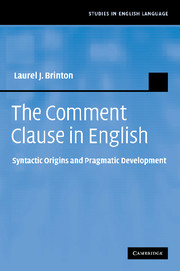Book contents
- Frontmatter
- Contents
- List of figures
- List of tables
- Acknowledgments
- List of abbreviations
- 1 Introduction: comment clauses, parentheticals, and pragmatic markers
- 2 Semantic and syntactic development of pragmatic markers
- 3 Processes of change
- 4 Comment clauses with say
- 5 I mean
- 6 Comment clauses with see
- 7 If you will and as it were
- 8 Comment clauses with look
- 9 What's more and what else
- 10 Epistemic/evidential parentheticals – I gather and I find
- 11 Concluding remarks
- References
- Author index
- Subject index
11 - Concluding remarks
Published online by Cambridge University Press: 12 July 2009
- Frontmatter
- Contents
- List of figures
- List of tables
- Acknowledgments
- List of abbreviations
- 1 Introduction: comment clauses, parentheticals, and pragmatic markers
- 2 Semantic and syntactic development of pragmatic markers
- 3 Processes of change
- 4 Comment clauses with say
- 5 I mean
- 6 Comment clauses with see
- 7 If you will and as it were
- 8 Comment clauses with look
- 9 What's more and what else
- 10 Epistemic/evidential parentheticals – I gather and I find
- 11 Concluding remarks
- References
- Author index
- Subject index
Summary
Introduction
The foregoing study has involved a corpus investigation of the diachronic development of a number of “comment clauses,” or sentence disjuncts of clausal origin, that are based on common verbs of perception and communication, such as look, see, say, and mean. These comment clauses assume diverse syntactic forms: present-tense verbs with first-person subjects (I say, I daresay, I see, I mean, I find, I gather), with second-person subjects (you say, you see), and with third-person subjects (that is to say), adverbial/relative structures (as you say, as/so you see, if you will, as it were, as I find, as I gather, what's more), and imperative clauses (look, see, hark, listen, hear).
The chapter will first review the theoretical background of this study (§11.2) and will synthesize the results of the case studies in regard to the syntactic sources of comment clauses (§11.3). It will end with a possible interface with another theoretical model as well as some directions for future research (§11.4).
Background of the study
Several assumptions, which are explored in the first three chapters of this work, underpin the case studies, namely, that comment clauses are parenthetical pragmatic markers of clausal origin (§11.2.1), that in their historical development comment clauses undergo grammaticalization (§11.2.2), and that in contrast to the well-understood development of non-clausal pragmatic markers, the prevailing view of the origin of comment clauses – what I have termed the “matrix clause hypothesis” – is problematic in a number of ways (§11.2.3).
- Type
- Chapter
- Information
- The Comment Clause in EnglishSyntactic Origins and Pragmatic Development, pp. 240 - 256Publisher: Cambridge University PressPrint publication year: 2008



